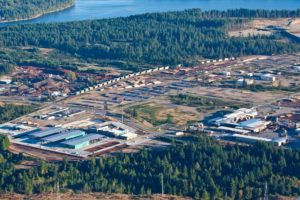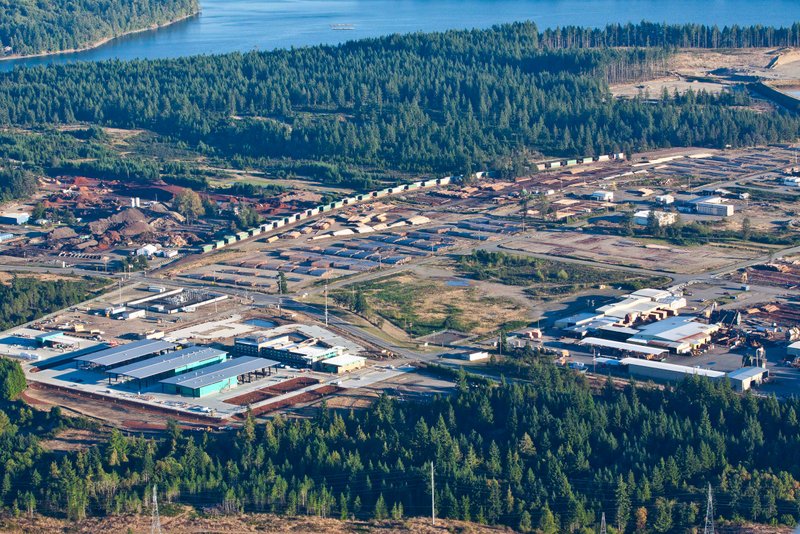Small rural towns throughout Washington State, take heart. You have an ally, one you may not be aware of or even know about, but who wants to see your community thrive. Just ask the Port of Shelton.
Through a successful partnership with the Community Economic Revitalization Board (CERB), the Port of Shelton obtained $750,000 in grant funding and low-interest loans that enabled one of their tenants, Lynch Creek Farm, to put in loading docks and create the infrastructure to expand their business. The infrastructure will remain, regardless of who occupies the property, but in the meantime, business at Lynch Creek has quadrupled. “We were all pretty excited when this came through,” says the Port’s Executive Director Wendy Smith.

In an innovative blend of the public and private sectors, CERB provides funding to local governments and federally recognized tribes for public infrastructure that supports private business growth and expansion. The Lynch Creek Farm project is a case in point: private business operating on Port property. The holiday greens and wreath company’s expansion has led to more jobs and greater economic vitality for the region, employing 350 staff and quadrupling sales.
“CERB is unique for state funding,” says Program Director and Tribal Liaison Janea Delk. “We have a dedicated staff person whose main role is to go out to local governments and talk to them about potential projects. She helps us figure out what’s eligible.” Qualified projects include domestic and industrial water, stormwater, wastewater, public buildings, telecommunications and port facilities.

The application process is lengthy, taking approximately eight weeks for phase one and another six weeks for the second phase. “We determine the purpose of the public infrastructure and create a contingency agreement with the local government,” says Delk. “There has to be significant job creation and capital investment of their own, which could be through equipment or matching funds. The projects need to expand production or create jobs.”
In the final stage, the staff member who’s been working with the applicant throughout the process makes a recommendation to the board. The applicant then presents an overview of their project at the ensuing board meeting, and members vote on the spot. “Our job is to help applicants get to yes with the board,” says Delk. “There are six months of pre-project procedures like environmental reviews and tribal cultural resource reviews. They have to provide evidence that the private investment is secure.” Most applicants experience a learning curve, she notes, so any assistance they get is welcome.
Once projects have been approved for funding, CERB tracks them for four to five years, depending on whether they involve construction or not, monitoring how many full-time employees they generate and how much tax revenue increases. Statewide, the agency has invested $163 million in communities, encouraging private and local investments adding up to around $34 for every $1 for CERB. Projects have created over 35,000 permanent jobs and generated $385 million in other public funds and $5.6 billion in private investment.

When CERB staff initially met with the Port of Shelton, they heard from Lynch Creek owner Andy Hunter at the same time. “The Port had applied to develop loading docks and remove concrete footings that would help Lynch Creek hire more people,” says Delk. “Looking at the impact on the community, they had a really great story.” In addition to removing numerous footings, the entire site was resurfaced and paved to prepare for the increased commerce as Lynch Creek expanded.
Hunter’s company started as a family hobby that grew into a thriving business in the early 80s. Andy Hunter took over the family business from his parents in 1998. The company began renting an old hangar from the Port before moving into their current location at a former mill site. The industrial nature of the property, along with the CERB investment, has helped them grow exponentially in a relatively short time.
“Our business lends itself to being unique,” says Hunter. “We expand and contract so much throughout the year and seasonally. The Port property allows us a reasonable rent and a good place for us to work.”
The business is a good fit for CERB’s mission, says Delk. “They’re trying to expand their market into the international arena and make their season longer by doing different kinds of products. They pay pretty well, which is one of the things we look at.” To qualify, businesses need to exceed the county median wage ($16.48 in Mason County).

Another criterion is making sure the business can expand in its current location. “We examine whether the industry is a good one for the region,” says Delk. “We also make sure the public infrastructure will continue to be owned and maintained by our client.”
The arrangement is working for Hunter, who credits Smith for her support. “She takes care of her tenants,” he says. “Wendy is very easy to work with, pro-business and very supportive of the community. We appreciate what the Port has to offer.”
And, the success of Lynch Creek Farms’ partnership with The Port of Shelton and CERB is proving a model for another Port tenant. “We are excited that we’ve entered into the second phase of the CERB process with another long-term tenant looking to expand operations and substantially increase their workforce,” shares Smith. The partnership with CERB is enabling economic growth to continue throughout the Port, supporting Mason County and the entire region.
To learn more about the Port of Shelton, visit the Port of Shelton online or call 360-426-1151.
Sponsored




















































